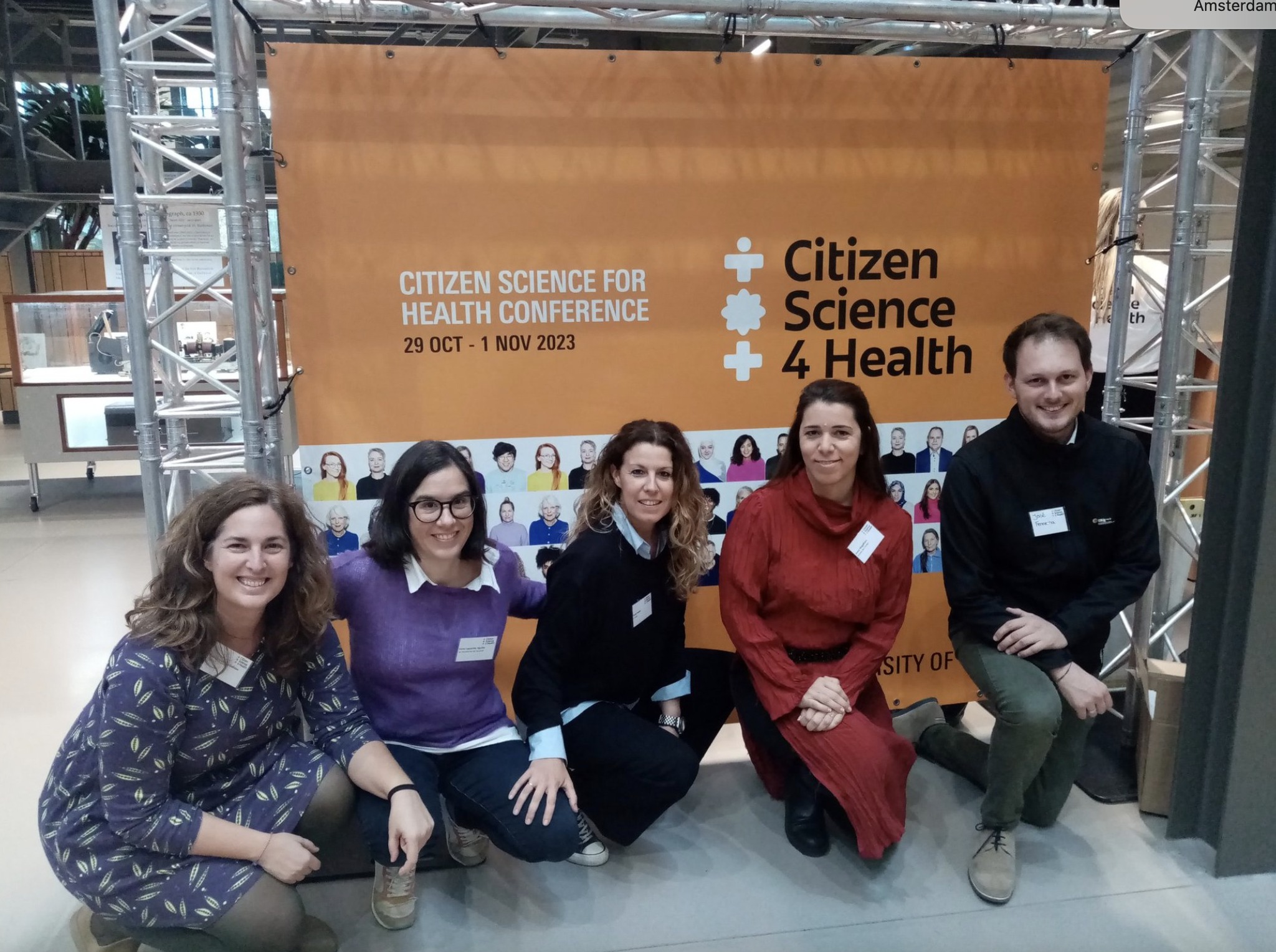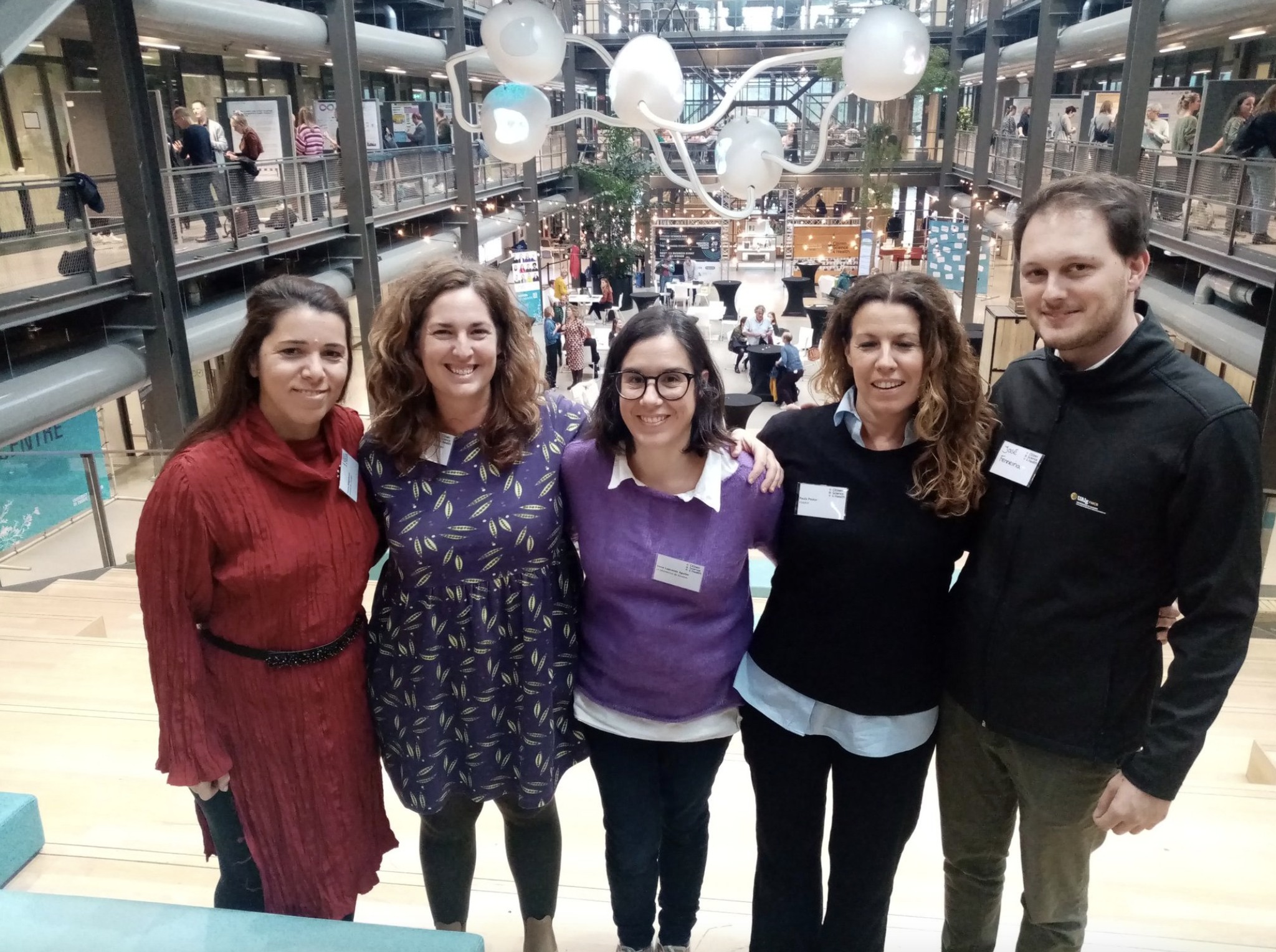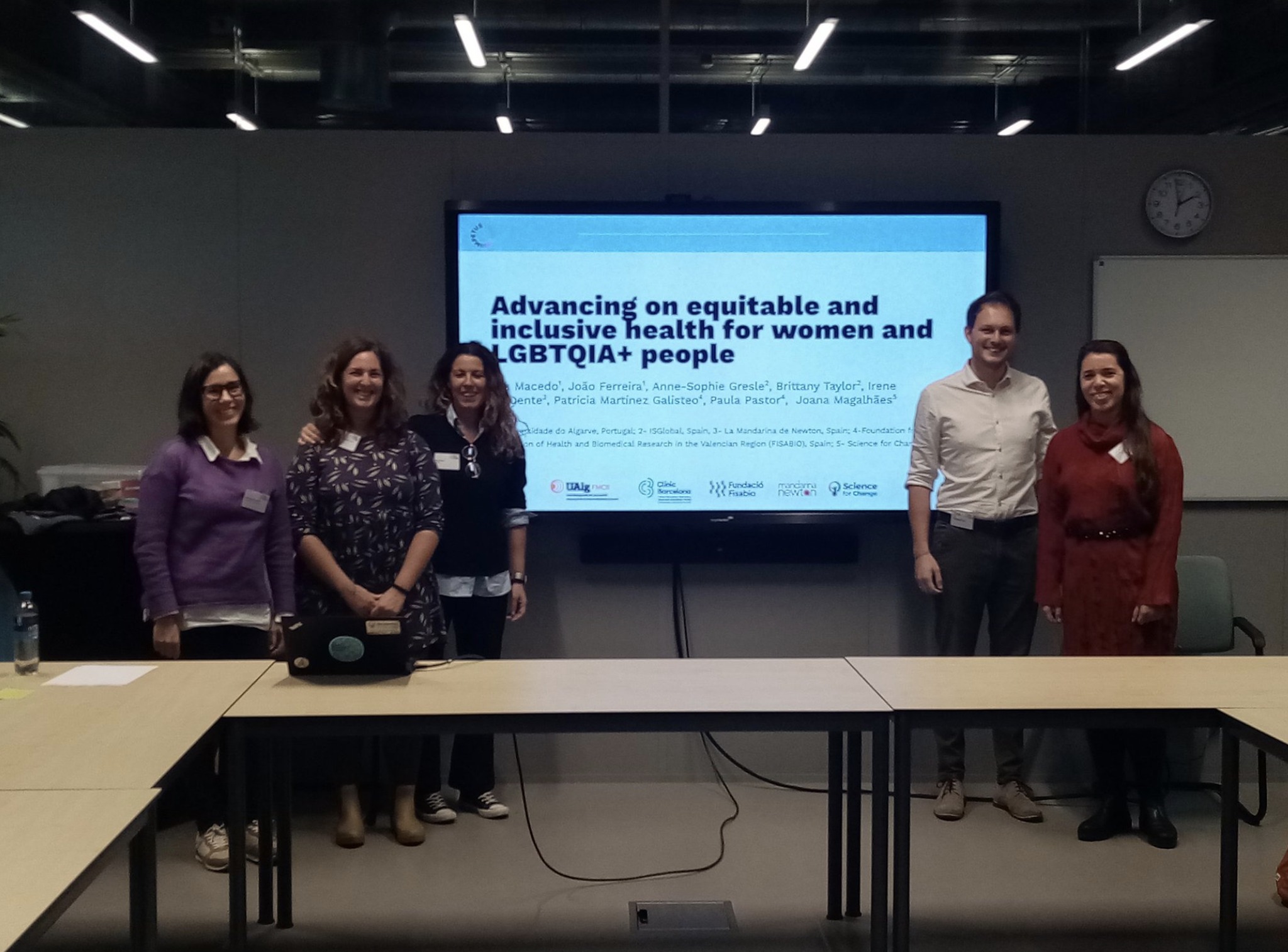Last Month, the IMPETUS team attended the Citizen Science for Health Conference. This was the first international event of its kind, focusing on the intersections between modern health research and the potential role citizen science can play.
The Conference was organized by members of the Citizen Science for Health Working Group from the ECSA, and took place over the 30th-31st of October, in the beautiful campus of the University of Twente, in the Netherlands, and hosted by the Design Lab, with more than 150 people, including researchers, practitioners and citizens in attendance.
Advancing equitable and inclusive health for women and LGBTQIA+ people is a transversal goal for four of the IMPETUS Accelerator CSIs: MENINA, Obstetric Coevolution, ENDOHEALTH and “Equity in health for LGBTQIA+ people”.
Together with our team member, Joana Magalhães from Science For Change, representatives of these CSIs held a workshop to explore common barriers and solutions to embed and mainstream gender perspective and intersectionality within health care and research from the patient perspective.

You can check out their full presentation here!
We also used this opportunity to ask our friends from Equity in Health for LGBTQIA+ people, MENINA and Obstetric Coevolution to share some of their thoughts on the importance of representation in healthcare, and how being part of the IMPETUS accelerator has helped them achieve their goals.
What are the main obstacles to non-male perspectives being included in medical research?
Obstetric Coevolution
The main obstacles to non-male perspectives being included in medical research are several, and it is difficult to sum up all of them. I would say the most prominent challenges would be the under-representation of women as researchers, the bias of seeing women as men without taking into account their biological differences and the gender discrimination that results from living in a patriarchal society.
The world of research is very male-dominated, there are far fewer female principal investigators, and this fact leads to the female perspective being under-represented in studies. Historically, what men were interested in was health, but since they didn’t know any other health than their own, they were really concerned with men’s health. For many years, it was assumed that studies done on men could be extrapolated to women without any difference because it was assumed that the anatomy was the same. Already in Ancient Greece, the female body was seen as that of a “mutilated, inward-turned male”. It has taken women to break into the field of health research to prove that there is a biological dimorphism between the sexes.
There is also an innate complexity in the study of non-male individuals, which is hormonal cycles and the variability involved in their existence. Even so, this is not sufficient reason to stop studying half of the population; on the contrary, it is necessary because the results obtained with male individuals cannot be extrapolated to the female sex.
It should be added that living in a patriarchal society leads to an underestimation of the health problems of non-male individuals, and the necessary resources are not allocated to change this situation.
How does this data gap in health research impact the health and treatment of under-represented groups?
Obstetric Coevolution
Not knowing how diseases, and treatments, affect these individuals is a huge health risk by itself.
On the one hand, the same disease can be expressed differently in one sex than in the other, making diagnosis and treatment difficult, as in the case of cardiovascular diseases. On the other hand, there are also diseases that do not exist in male bodies, and these diseases are not well understood and cannot be treated efficiently. They are even infra-diagnosed or late-diagnosed. It should also be added that the same treatment can have different side effects in each sex, and in fact, more side effects are described in women due to low inclusion in pharmaceutical clinical trials.
In addition to the above, the fact that the female sex is not well known has repercussions on reproductive health as well, assuming that certain treatments or interventions during childbirth have no effect on women’s health.
What work is your CSI conducting help to fix this issue?
MENINA
The MENINA project aims to obtain new knowledge regarding the mental health status and well-being of women during pregnancy and the role that healthcare has in all of this. We would like to create awareness regarding the importance of perinatal mental health to create new protocols or improve the assistance provided to women and their families.
Obstetric Coevolution
Obstetric Coevolution focuses on studying a part of the health of non-male individuals as it studies how obstetric practices during childbirth have an effect on mental health, with a particular focus on the effect on postpartum depression.
Childbirth, all the protocols surrounding it and its long-term effects have been undervalued as an object of study because they belong to the woman’s body. So our CSI is trying to reduce this gap of knowledge and understanding about the non-male body’s health.
What are the strengths of using citizen science approaches in improving representation in health research?
Obstetric Coevolution
Citizen science offers many advantages in terms of focusing the study on underestimated problems. Moreover, it facilitates the engagement of a diverse range of participants, including those from underrepresented groups. Citizen Science makes participants active contributors to the research, who ensure that the studies take the right direction and that they are relevant to themselves.
Thus, the under-represented population has the option to mark the key points that affect them and participate in their study, including setting the agenda of the study. This is also a very positive point because it empowers the whole community that participates in it.
Another strength of citizen science is that actively involving participants and empowering them as co-researchers leads to a sense of ownership that helps them to stay with the study, which is why participation rates from start to finish are high.
It is also worth noting that participation in this type of project provides people with tools to better understand research and the interpretation of health information.
MENINA
Involving pregnant women as citizen scientists in MENINA brings us the added value of exploring the main challenges from the perspective, vision and needs of women who are facing the experience. In addition, it implies the possibility to co-create new solutions among all stakeholders involved in the challenge: pregnant women, obstetricians, midwives, psychologists and so on.
What have been the biggest challenges in conducting your research?
Obstetric Coevolution
The biggest challenges during our study have been first and foremost – participation. We would have liked to have had more participants in the workshops, although on the other hand, the fact that there were slightly fewer participants has allowed us to generate spaces of trust that have led to the cohesion of the community. It should be noted that in online activities, such as the co-created survey, participation is very high. So the challenge is in the presence, and not in the interest of the topic.
MENINA
Our main challenge was the recruitment of the participants. We defined some inclusion criteria and jointly with the limited time that we had to recruit, we had to reinforce the people recruiting as well as timing to recruit so as to reach the expected sample.
How has being part of the IMPETUS community and working alongside other related projects helped you achieve the aims of your CSI?
Equity in health for LGBTQIA+ people
IMPETUS not only gave us important tools to develop a sustainable project but also allowed us to share our objectives, strategies and setbacks. This creates an environment rich in solutions sharing and creative discussions, which has been an important addition to our projects.
Obstetric Coevolution
IMPETUS has given us valuable tools to push the project forward and make it possible. On the other hand, we have met other teams, like the MENINA’s project team, with whom we have started to collaborate already.

Participating with them and with the teams working on ENDOHEALTH and “Equity in health for LGBTQIA+ people” projects also brought us closer and allowed us to start conversations and explore new possibilities.
MENINA
We are really happy with the IMPETUS community because they bring us the proper environment and spaces to know and explore synergies with other projects. We would like to stress the relationship that has been created with the Obstetric Coevolution project, as we have similar objectives we have since the beginning of contact. They will participate in our final Workshop event and have already submitted a joint project to a national funding agency in Spain to continue working in perinatal health.
What have been the key findings so far from your research?
Equity in Health for LGBTQIA+ people
Healthcare professionals from the primary care setting, as medical students, presented significant lacks regarding knowledge related to the LGBTQIA+ people’s specific needs. With this evidence, we feel compelled to act and embrace citizen science strategies to address it.
We believe that a true qualification of healthcare professionals is a priority for changing the heteronormativity way of thinking. These under-represented groups have specific health-related issues that must be part of the healthcare educational curriculum.
MENINA
We have already identified the main pain points related to mental health and well-being during pregnancy from the pregnant women’s perspective but also we went deeper into the vision of the healthcare professionals that are following pregnant women.
The perspectives and vision of all stakeholders serve us to co-create together new solutions that solve the challenges already identified. We are currently working on the preparation of the co-creation session.
Obstetric Coevolution
We identified the challenges faced by mothers and professionals during pregnancy, childbirth and postpartum: fear, instrumentalization of childbirth, communication, postpartum and mental health. We then devised and prototyped 4 projects that address these challenges. We have also materialized all the actors needed to push the projects. In addition, a survey has been co-created to collect data on childbirth and postpartum in order to generate new knowledge.
It is super important, and super urgent that the medical community starts to work on empathy to increase the trust level of all collectives and, therefore, improve confidence in medical visits. It is also important to eliminate the stereotypes linked to the collective imaginary, they are created by the patriarchy.
We would like to extend a huge thank you to the teams at MENINA, Obstetric Coevolution, ENDOHEALTH and “Equity in Health for LGBTQIA+ people, for the great work they are doing, and for sharing their observations at the Citizen Science for Health Conference.
We are very excited to see how these projects develop and grow in the last phase of the IMPETUS accelerator, and beyond!



